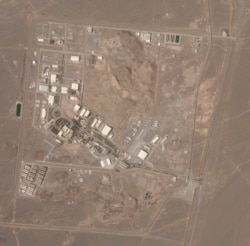U.S. Defense Secretary Lloyd Austin is in Israel Monday, meeting with Israeli officials about Iran. The meeting comes as a power failure at the Iranian nuclear site of Natanz reportedly caused massive damage to Iranian centrifuges. Iranian officials blamed Israel and threatened to avenge the attack.
Israel rarely takes responsibility for attacks like the one in Natanz that Israeli news reports on Monday said could set the Iranian nuclear program back by nine months. But the Israeli army Chief of Staff, Aviv Kochavi, hinted Israel may have been involved.
Kochavi said the Israeli army’s activities in the Middle East "are not hidden from the eyes of the enemy, that they are watching us, they see our capabilities.”
Secretary Austin - the first official from US President Joe Biden’s administration to visit Israel - did not mention Iran directly, saying only that he and Israeli Defense Minister Benny Gantz discussed regional security challenges.
Austin’s visit came as the U.S. looks to restart talks with Iran about reviving the Iran nuclear deal, the JCPOA, after former President Trump pulled out of the agreement in 2018.
Israeli Prime Minister Benjamin Netanyahu has come out strongly against the deal, saying it gives Iran a legal way to acquire a nuclear weapon.
Iran analyst Eldad Shavit says the growing tensions between Israel and Iran might push the Biden administration closer to a new deal with Iran.
"There is reason to assess or to believe that the administration will be now even more under pressure to reach an agreement with the Iranians because its their strategic objective to return to JCPOA, because they don’t have an alternative policy vis-a-vis Iran," Shavit said.
In the past few weeks, there have reports of several Israeli attacks on Iranian targets including on a Revolutionary Guard base on a ship.
Sima Shein of the Institute for National Security Studies says Iran will try to retaliate for these and especially for the Natanz attack.
"If I have to put the list of what are the possibilities of Iran to retaliate they would prefer to do it in several places, in several fields if they have the capability," Shein said. "They tried in the past and I am sure they will try again in the cyber field, if they have any capability, a dramatic one to penetrate into Israeli civilian infrastructure, they tried as you know in the water field and others, they will try to do it in the future if it will be possible for them and successful."
Iran’s foreign minister said the Natanz site will be rebuilt with more advanced centrifuges than can enrich uranium even faster.





